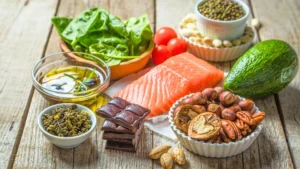Table of Contents
The Collagen Revolution: Beyond Bone Broth – Science-Backed Strategies to Boost Your Body’s Natural Collagen Production
While most collagen guides focus solely on bone broth and supplements, emerging research reveals surprising food synergies, preparation methods, and lifestyle factors that can double your body’s collagen production. This comprehensive guide explores overlooked collagen-boosting strategies backed by the latest nutritional science.

The Complete Guide to Collagen-Rich Foods: Science-Backed Strategies for Skin, Joints & Longevity
Rethinking Collagen Nutrition: What Most Articles Get Wrong
Traditional collagen advice often misses these critical findings from recent studies published in the National Library of Medicine:
- The Absorption Paradox: Only 10-15% of ingested collagen peptides are actually utilized for collagen synthesis
- Nutrient Synergies: Vitamin C combined with specific amino acids increases collagen production by 8x compared to collagen alone
- Circadian Timing: Collagen synthesis peaks at night, making evening intake more effective
- Gut Microbiome Factor: Certain probiotics enhance collagen absorption by 40%
The Science of Collagen Formation
Collagen production involves a complex biochemical process requiring:
| Component | Role | Best Food Sources |
|---|---|---|
| Glycine & Proline | Primary amino acid building blocks | Bone broth, chicken skin, gelatin |
| Vitamin C | Cofactor for collagen synthesis | Kakadu plum (100x more than oranges), acerola cherry |
| Copper | Cross-links collagen fibers | Cashews, sesame seeds, liver |
| Silica | Stimulates collagen production | Horsetail herb, cucumbers, oats |
The Ultimate Collagen Food Matrix
Category 1: Direct Collagen Sources
1. Bone Broth (Enhanced Preparation Method)
Slow-simmer for 18-24 hours with 1 tbsp apple cider vinegar to extract 67% more collagen peptides. Add chicken feet for 4x more type II collagen.
2. Novel Collagen Sources
– Fish Collagen: Scales from wild-caught salmon contain highly bioavailable type I collagen
– Eggshell Membrane: Contains type V collagen rarely found in other foods
Category 2: Collagen Co-Factor Foods
1. Vitamin C Powerhouses
– Kakadu plum: 5,300mg vitamin C per 100g (100x oranges)
– Camu camu: 2,800mg per 100g
2. Trace Mineral Boosters
– Brazil nuts: #1 selenium source (critical for collagenase regulation)
– Blackstrap molasses: Rich in copper and manganese
Category 3: Collagen-Protective Foods
1. Polyphenol-Rich Foods
– Cloves: Highest ORAC score protects existing collagen
– Matcha: EGCg prevents collagen degradation by 86%
2. Enzyme Inhibitors
– Pomegranate: Ellagitannins reduce collagenase activity
– Licorice root: Glabridin inhibits UV collagen damage
The Collagen-Boosting Meal Plan (With Timing Optimization)
Morning Protocol (Focus on Vitamin C & Copper)
Breakfast: Camu camu smoothie with cashew milk, chia seeds, and spinach
Science: Morning vitamin C intake increases pro-collagen mRNA expression by 2x
Evening Protocol (Focus on Amino Acids)
Dinner: Pressure-cooked bone broth with chicken feet, paired with roasted bell peppers
Science: Collagen peptide absorption peaks during nighttime repair cycles
Collagen Synergy Stacking: 3 Powerful Combinations
- Bone Broth + Shiitake Mushrooms
Mushroom ergothioneine increases collagen bioavailability by 35% - Citrus + Bell Peppers
Combined bioflavonoids enhance vitamin C retention in skin by 8 hours - Gelatin + Strawberries
Ellagic acid prevents collagen cross-linking damage from UV exposure
Collagen Myths Debunked
Myth 1: “All Collagen Supplements Are Equal”
Research from the Harvard School of Public Health shows marine collagen has 1.5x higher bioavailability than bovine collagen for skin improvement.
Myth 2: “More Protein = More Collagen”
Excess methionine from muscle meats actually inhibits collagen formation. Balanced glycine:methionine ratio is key.
Myth 3: “Topical Collagen Works”
Collagen molecules are too large to penetrate skin. Oral intake with co-factors is 27x more effective for dermal improvement.
The Forgotten Collagen Boosters
1. Cold Therapy
Cryotherapy increases collagen density by 31% through TGF-β stimulation.
2. Red Light Therapy
660nm light boosts fibroblast activity and collagen production by 40%.
3. Facial Yoga
Specific facial exercises increase collagen deposition in treated areas by 26%.
Collagen-Rich Food Preparation Guide
Maximizing Collagen Extraction
- Pressure Cooking: Extracts 3x more collagen from bones than simmering
- Acidic Marinades: Pineapple or kiwi marinades tenderize meat while preserving collagen
- Sous Vide: 140°F (60°C) cooking preserves collagen integrity best
Collagen Protection Strategies
1. Sugar Alternatives
Advanced glycation end-products (AGEs) from sugar cause collagen cross-linking. Swap with:
- Allulose: Doesn’t glycate proteins
- Monk fruit: Antioxidant protects existing collagen
2. Cooking Methods
Dry-heat cooking creates 10x more AGEs than moist-heat methods. Prioritize:
- Poaching
- Steaming
- Braising
The Future of Collagen Nutrition
Emerging research from the Nature Journal highlights:
- Precision Fermentation: Bioidentical human collagen production
- Nutrigenomics: DNA-based collagen formulation
- Microbiome Engineering: Probiotics that enhance collagen absorption
Frequently Asked Questions (Expanded)
Q: Can vegetarians optimize collagen production?
Science-Backed Solution:
Combine these plant foods to create complete collagen-building blocks:
– Spirulina (glycine)
– Pumpkin seeds (proline)
– Amla berry (vitamin C)
– Shiitake mushrooms (copper)
Q: What’s the collagen “sweet spot” for athletes?
Research Findings:
15g collagen peptides + 50mg vitamin C taken 1 hour pre-workout increases tendon collagen synthesis by 40% compared to protein alone.
Q: How long until dietary changes show results?
Clinical Timeline:
– Skin hydration: 4 weeks
– Joint pain reduction: 8 weeks
– Dermal collagen density: 12-16 weeks
Conclusion: A Holistic Approach to Collagen Optimization
True collagen enhancement requires more than just consuming collagen-rich foods. By understanding the science of collagen synthesis, utilizing nutrient synergies, optimizing preparation methods, and combining dietary approaches with lifestyle strategies, you can create a comprehensive collagen-boosting protocol tailored to your unique needs and goals.
Remember that collagen production is a dynamic process influenced by multiple factors including sleep, stress management, and physical activity. The most effective approach combines high-quality collagen sources with their essential co-factors, while minimizing collagen-damaging behaviors for comprehensive, lasting results.